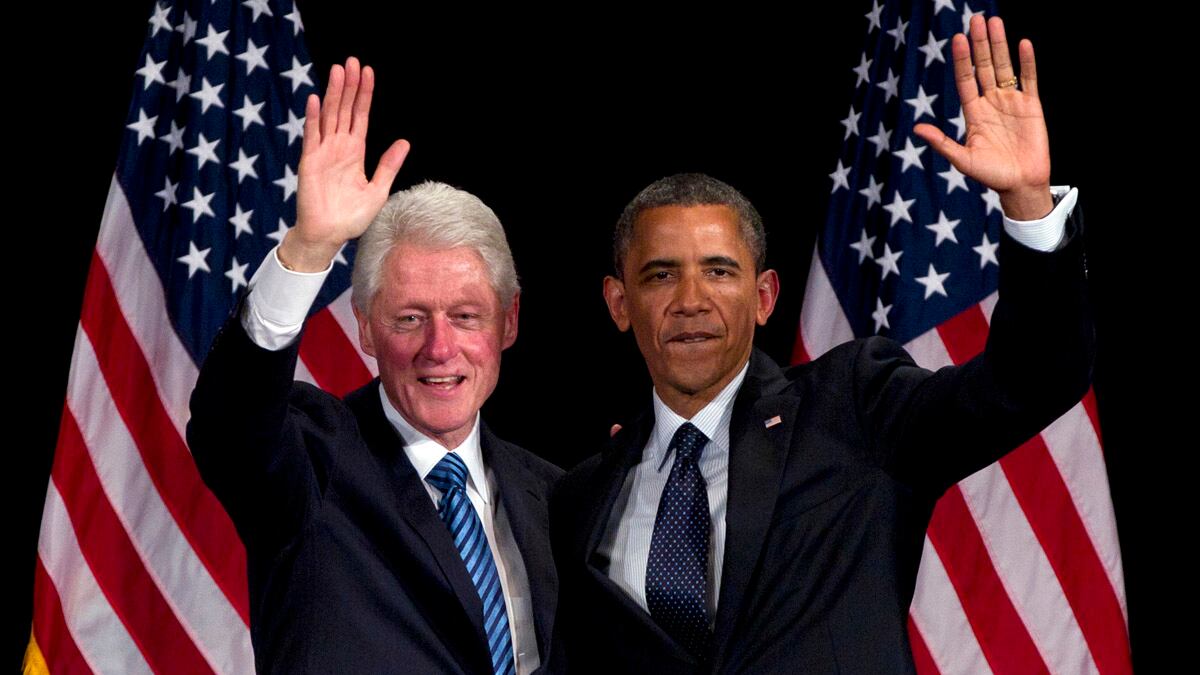As they plan their defense of a beleaguered White House, the increasingly stressed Obama campaign team could learn important lessons from a cheesy, embarrassing board game from 1995. This failed novelty item called “Clintonopoly” drives home the point that whenever a sitting president runs for reelection, the contest will always turn on attitudes toward that incumbent, and never on the foibles of his challenger.

These reflections connect to an unexpected household discovery that brought me back to the bad old days of Slick Willy vs. The Vast Right Wing Conspiracy. My wife and I have been cleaning out our upstairs closets to accommodate our youngest child, Danny, who recently returned home after two years away (in Israel and California) to continue his university education. During these archaeological excavations, we turned up the dusty, battered, badly-faded box containing “Clintonopoly: The Great American Sell-Off.” Once used by our older kids, apparently, it featured broadly-drawn caricatures of a very youthful Bill-and-Hillary, trampling a map of the United States with a “For Sale” sign planted in Washington, D.C. The two running rascals clutched a briefcase bursting with dollar bills, a deed labeled “Whitewater” and a juicy Big Mac.
The game itself offered one witless insult after another, alluding to dozens of shockingly silly Clinton scandals that destructively obsessed those of us on the right for the better part of eight years. With a sense of mature perspective, it’s cringe-inducing to recall the feverish focus on Hillary’s dubious trades in cattle futures, the shake-up in the White House travel office, Vince Foster’s suicide, the Gennifer Flowers affair, pot-smoking among the White House staff, “I didn’t Inhale,” the Arkansas state troopers, the Rose Law Firm, the Lippo Group, draft-dodging in the 1960s, Mena Airport, the boys on the railroad track, Roger Clinton’s drug dealing, the Clinton “Circle of Death,” Paula Jones, Whitewater, Jim and Susan McDougal, and on and on and on.
The Clintonopoly game made no mention of Monica Lewinsky or the protracted impeachment crisis that only emerged and festered in the years after the game’s creation. Nor did the game-makers allude to the Starr Report, Kathleen Willey, Linda Tripp, Juanita Broderick, the Mark Rich pardon scandal or a host of other humiliations that distracted conservatives (including this conservative) from far more important business during Clinton’s second term.
In retrospect, the Republican emphasis on Bill Clinton’s innumerable imperfections did far more damage to the GOP than it did to the 42nd president. The one big conservative victory against the dominant Democrats occurred in the Congressional elections of 1994, when Newt Gingrich’s “Contract with America” focused on a positive agenda for change rather than efforts to expose presidential peccadilloes.
In a sense, Slick Willy offered too tempting a target to resist, especially during his first run for office in 1992. With the incumbent president George H. W. Bush burdened with a sour economy and the rancid aftertaste of breaking his no-new-taxes pledge, GOP strategists decided it might be easier to discredit the challenger than to defend the incumbent. To their amazement, the electorate seemed uninterested in the Democratic candidate’s deceptive handling of the Vietnam draft, his evasive answers about marijuana, his obvious history of tomcatting in Arkansas, his wife’s occasionally abrasive public pronouncements, or the dubious land deals that helped the two of them pad Bill’s modest salary as Arkansas governor. The campaign inevitably pivoted on reactions to the president, not to his prime rival; those 19 percent who couldn’t bring themselves to vote for Clinton but still wanted to vote against President Bush turned to the bizarre option of H. Ross Perot, and helped Bubba win by a comfortable margin.
The same pattern prevailed in 1996, when Bob Dole and his Republican supporters wanted to make the election into a referendum on Clinton’s character and his pre-presidential history, rather than concentrating on his actual service in the White House. With a booming economy and a disappearing deficit, the right made few new converts, even with Paul Shanklin’s supremely clever parody songs on Rush Limbaugh’s show, or the “White House Drug Test” specimen cups handed out at the GOP convention, or household diversions like Clintonopoly. Bob Dole, wounded war hero and formidable public servant, might balefully bellow “where’s the outrage?” but the electorate amiably ignored him at a time of falling unemployment and rising confidence. Most of the public continued to scoff at all the charges against a popular president, even after incontrovertible evidence of perjury and obstruction of justice led to the first presidential impeachment in 130 years.
This pattern of failed and often feeble attacks by implacable Clinton foes of the 1990s should give today’s Democrats strong grounds to pause before they repeat the same mistakes in their increasingly desperate efforts to destroy Mitt Romney.
In responding to deeply disappointing employment numbers for the month of June, for example, the Obama high command didn’t offer some bold new policy initiative, or indicate a fresh willingness to strike that ever-elusive “Grand Bargain” with the truculent conservatives in the House. Instead, they immediately refocused on Romney’s business career, demanding 10 years of past tax returns and raising questions about corporations in Bermuda and bank accounts in Switzerland. Or else they questioned the Romney family vacation in New Hampshire, and expressed disgust at his large, obnoxious, and gas-guzzling power boat. Of course, this leaves liberal leaders to face the obvious observation that not even 30 years of Romney tax returns would create new jobs, nor would it significantly help the economy if Mitt and Ann donated all their pleasure craft and Jet Skis to some deserving charity. As the first President Bush painfully discovered, appalling revelations about Bill Clinton’s manipulations of the selective service system (which demonstrated a consistent pattern of self-serving deception) did nothing to provide the frustrated administration with the sharp economic jolt they needed for political survival in 1992.
No embattled incumbent has ever succeeded in securing reelection by savaging his opponent rather than defending his own record of achievement—as Jimmy Carter learned to his chagrin in 1980, when his partisans tried to frighten the nation about the senile “dummy actor” and “right-wing fanatic” who ran against him.
Contrary to common assumptions, the Bush-Kerry campaign of 2004 offers no countervailing example. Yes, Republicans spent a great deal of time and money to portray John Kerry as an inveterate flip-flopper and to question (through Swift Boat Veterans for Truth) the Vietnam War hero status that played a central role in his campaign. But ultimately, Karl Rove and his colleagues ultimately understood that they needed to build Bush up more than they needed to knock Kerry down, and they proceeded accordingly.
Though it seems hard to believe eight years later, the majority of Americans felt deep affection for George W. Bush when he ran for reelection and felt comfortable with his economic and national security management, returning him to the White House with a surprising surge of support. How do we know? The numbers don’t lie: Bush not only won a substantially higher percentage of the popular vote than he did in 2000 (51 compared with 48 percent) but also showed a staggering increase in the number of voters who turned out on his behalf. George W. Bush won more than 10 million more votes in 2004 than he did in 2000—60,609,000 versus 50,456,000.
This year, not even David Axelrod expects Barack Obama to win 10 million votes he didn’t get in 2008, and the president himself has said he feels certain that the election will be closer than last time.
That’s why so many Democratic partisans want to focus on Romney’s personal vulnerabilities rather than the painful, perpetual stalemate and blame-gaming bitterness that characterize Obama’s Washington. But despite their temptations to shift the conversation away from the stalled economy, the voters will make their decision based on their comfort or discomfort with the substance and style of the present president’s leadership. They will prove less concerned with how Mitt Romney spent his money than with the way Barack Obama spent their money.
As always, the electorate will determine whether continuing the current course leads to prosperity and security, or more frustration. Except for already committed partisans to the Democratic cause, they will show less interest in the Romney family road trip with the dog on the roof, or the candidate’s alleged bullying of a high school class-mate, or the purported predations of Bain Capital some 20 years ago. The Obama team shouldn’t require the rediscovery of some forgotten remnant of a scandal-mongering past to reach the recognition that Romneyopoly—like Clintonopoly—is a loser’s game.






